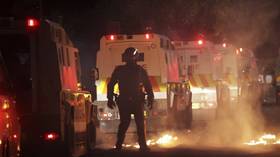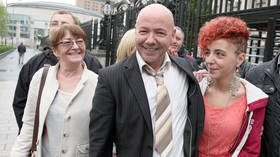Terror threat in Northern Ireland raised to ‘severe’

Britain’s security service MI5 has raised the terrorism threat level in Northern Ireland from “substantial” to “severe.” Thats according to the UK's Northern Ireland Secretary Chris Heaton-Harris, who on Tuesday stated that after the shooting of a police officer last month “a small number of people remain determined to cause harm.”
“MI5 has increased the threat to Northern Ireland from Northern Ireland Related Terrorism from ‘substantial’ (an attack is likely) to ‘severe’ (an attack is highly likely),” Heaton-Hayes wrote in a statement to parliament. “The public should remain vigilant, but not be alarmed, and continue to report any concerns they have to the Police Service of Northern Ireland,” he added.
The UK has five terror threat levels, ranging from ‘low’, meaning “an attack is highly unlikely,” to ‘critical’, meaning “an attack is highly likely in the near future.” ‘Severe’ is one step below ‘critical’ on the scale. Northern Ireland’s threat level was lowered from ‘severe’ to ‘substantial’ last year, the first time it had been downgraded since 2010. The rest of the UK has remained at ‘substantial’ since last February.
The change comes as US President Joe Biden and former President Bill Clinton prepare to visit Northern Ireland next month to mark the 25th anniversary of the Good Friday Agreement. Brokered by Clinton and signed on April 10, 1998, the deal involved nationalists and unionists agreeing to share power, while their respective armed paramilitary groups agreed to decommission their weapons in exchange for the release of political prisoners.
The peace was shattered four months later, however, when the Real IRA, an offshoot of the Irish Republican Army that opposed the agreement, detonated a bomb in the town of Omagh, killing 29 people. Paramilitary violence has continued at a low level since, and another attack in Omagh this February saw masked gunmen shoot and injure a police detective.
The New IRA, another dissident republican splinter group, claimed responsibility for the attack. The unionist DUP and nationalist Sinn Fein parties both condemned the shooting.
Northern Ireland has been without a government since last February, with the DUP opposing the British government’s Brexit deal with the EU, which places a customs barrier between the entire island of Ireland and Great Britain. Sinn Fein backs the deal, arguing that the only alternative would be a return to a hard border between the Republic of Ireland and Northern Ireland, a situation unseen since the decades of violence before the Good Friday Agreement.














